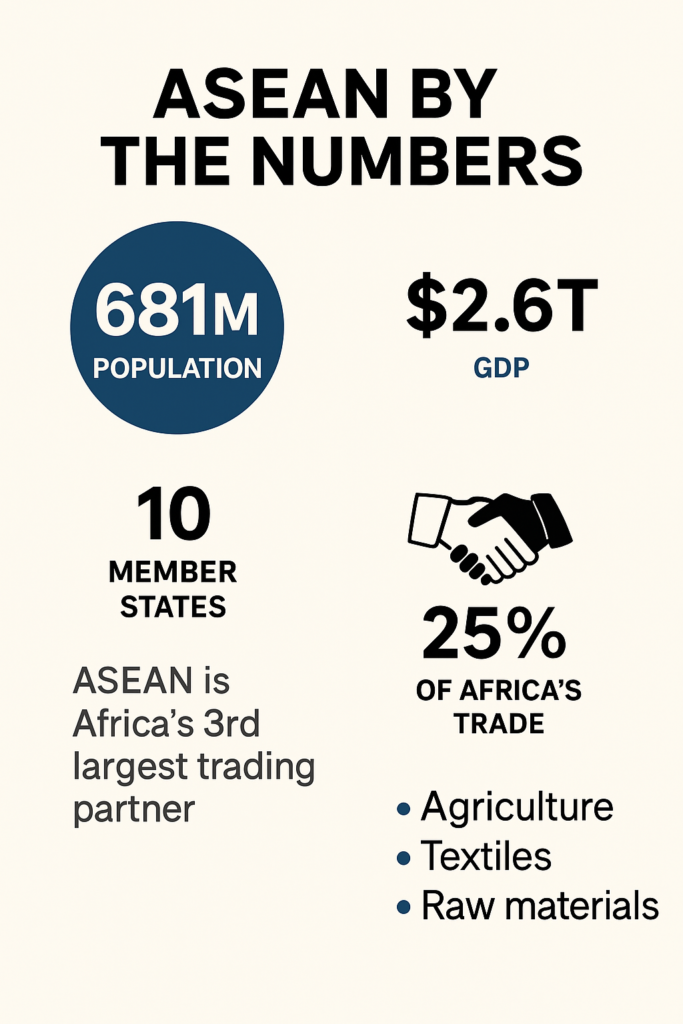By Kemi Osukoya | Africa Bazaar Magazine
President Donald Trump departed Washington Friday night for a five-day, three-nation tour of Asia that could reshape the trajectory of global trade. With stops in Malaysia, Japan, and South Korea, the trip marks another one of Trump’s most consequential overseas engagements since returning to office — one aimed at redefining U.S. economic relations with Asia amid mounting tariff disputes with China and domestic turbulence at home.
The ASEAN Summit, hosted by Malaysia, brings together leaders from the ten-member bloc — Brunei, Cambodia, Indonesia, Laos, Malaysia, Myanmar, the Philippines, Singapore, Thailand, and Vietnam — alongside global partners from China, the U.S., Japan, Russia, Europe, the Middle East, and Africa.
PARTNER’S PRODUCT
Experts say this summit isn’t just about Asia, it’s about the architecture of global trade — and who sets the terms for the next decade.
The 47th ASEAN Summit comes at a pivotal moment. The Trump Administration is preparing to nearly triple tariffs on Chinese imports in November unless a breakthrough is reached with President Xi. China’s retaliatory measures have already throttled U.S. agricultural exports and restricted access to rare earth minerals — essential for semiconductors, batteries, and other industries crucial to Africa’s emerging technology sectors.

While in Kuala Lumpur, Trump is expected to oversee a series of high-profile trade signings, including agreements with Cambodia, Malaysia and Thailand, as well as witnessing a peace accord between Cambodia and Thailand — a move aimed at stabilizing Southeast Asia’s political landscape and reassuring investors.
The trip will culminate in South Korea, where Trump is scheduled to meet Chinese President Xi Jinping for what White House officials describe as a “make-or-break” dialogue. The two leaders are expected to discuss a new trade framework and potentially sign a limited trade pact that could ease tensions over tariffs, fentanyl exports, and currency manipulation.
Ahead of the meeting, U.S. trade negotiators — led by Treasury Secretary Scott Bessent and U.S. Trade Representative Jamieson Greer — have been in Seoul, engaging Chinese counterparts on market access, digital trade, and rare mineral supply chains.
“This summit is about more than tariffs,” said a U.S. Treasury official. “It’s about whether the U.S. can rebuild trust in global trade — or if China will set the new rules.”
Global Economic Ripples — and Africa’s New Role
For Africa, the implications are significant. South Africa, represented by President Cyril Ramaphosa, joins the summit as an ASEAN Sectoral Dialogue Partner, solidifying its role as a bridge between Africa and Asia’s fast-growing economies.
Ramaphosa’s delegation will focus on energy transition, investment diversification, and digital trade cooperation — aligning with South Africa’s broader efforts to unlock new markets beyond the West.
“ASEAN represents a new frontier for African economies,” said a South African trade official. “These are the markets shaping the next era of global consumption and production — and Africa can’t afford to be on the sidelines.”
Africa’s participation also underscores the continent’s push for South-South cooperation — a strategy that aligns with the African Continental Free Trade Area and strengthens Africa’s position within BRICS and the G20. As Asia recalibrates its trade corridors, African policymakers see openings for joint ventures in mining, energy, fintech, and manufacturing.
PARTNER’S PRODUCT
Shop DEEBOT robotic vacuum cleaners at www.ecovacs.com/us
The ASEAN Summit agenda will heavily feature trade, technology, and sustainable growth. Host Prime Minister Anwar Ibrahim emphasized the role of the Regional Comprehensive Economic Partnership (RCEP) — the world’s largest trade agreement, which includes China and spans nearly one-third of global GDP.
For Africa, RCEP’s expansion could mean both opportunity and competition. As Asia accelerates its supply chain integration, African exporters face new challenges in maintaining competitiveness in agriculture, textiles, and raw materials — but also fresh opportunities to plug into Asia’s renewable energy and tech ecosystems.
Trump’s Asia trip comes as the U.S. government shutdown stretches into its fourth week, adding a layer of uncertainty to Washington’s trade diplomacy. Still, analysts say that the ASEAN Summit could provide a platform for resetting global economic alliances, including deeper engagement between Africa and Asia.
“Africa’s inclusion in ASEAN’s dialogue framework is more than symbolic,””said an economist. “It’s a recognition that Africa’s markets, minerals, and demographics are central to the next chapter of global growth.”
From Kuala Lumpur to Zimbabwe, the world is watching how Washington and Beijing navigate their uneasy coexistence — and whether emerging markets, from Africa to Southeast Asia, can seize this moment of economic realignment to define their own future.




